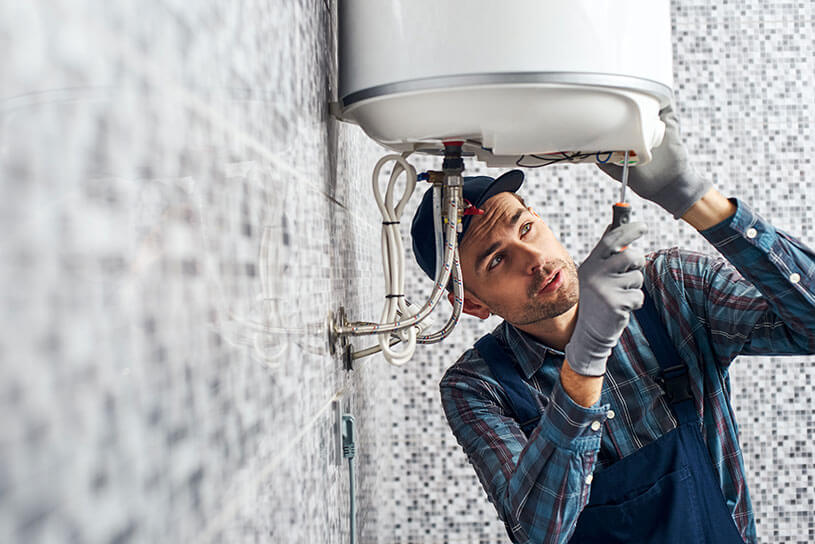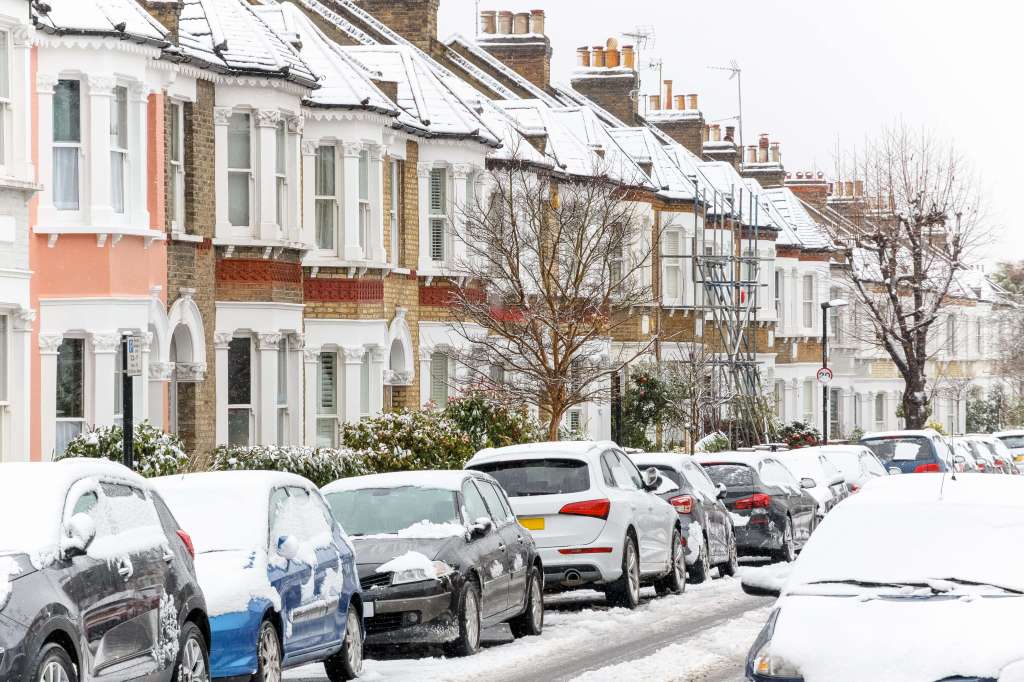Winter cold snaps can cause temperatures to plummet dramatically, so it’s vital that landlords know the signs of frozen pipes and how to avoid them.
During colder months, you can minimise the risk of flooding by taking steps to prevent frozen pipes. Read on to find out how to tell if your pipes are frozen, and how to fix them.
What are the risks of frozen pipes?
When temperatures drop during winter, the excess water inside a pipe expands as it freezes. The expansion can cause a split in the pipe, leading to leaks when the water thaws. In the worst case scenario, frozen water pipes can burst due to the increased pressure.
Leaking or burst pipes can cause serious water damage and potentially flooding, so it’s important that landlords do everything they can to stop this from happening.
Not only could a burst pipe cost you a lot of money to repair, you could lose rental income if a flood forces tenants to move out temporarily.
How to find a frozen pipe – 4 things to look out for
Here are four of the most common signs of frozen pipes:
- There’s no running water, or only a trickle – in these cases, the pipe leading to the tap may be frozen
- The pipe is frosted over – if you can see frost on a pipe, there’s a good chance that it’s frozen
- You notice odd smells – if a pipe is blocked because it’s frozen, you may notice an unpleasant smell coming from the taps or drains
- Your boiler isn’t working – if this happens during a cold snap, the condensate pipe (which is close to the boiler and takes condensation from the boiler to a drain) may be frozen
Read more: Landlord boiler responsibilities and boiler maintenance
How to fix broken pipes
If a pipe has frozen but it hasn’t burst, it’s crucial you act quickly. You’ll probably need to call a plumber to thaw your pipes, but if it’s not too serious you may be able to do it yourself.
Here are some tips on how to thaw frozen pipes:
- turn off the stopcock to stop the water supply
- use towels soaked in hot water, or hot water bottles, to begin thawing the pipes (start at the end of the pipe nearest the tap)
- you can also try pouring hot water over the pipe (there are plenty of YouTube videos which show you how to do this)
- hairdryers can also be used to thaw pipes, but make sure you never use a naked flame or blowlamp as it could be dangerous
For more information on preparing for winter weather (and what to do when it hits), visit our tips and resources hub.
What if the pipes have burst?
If your pipes have already broken through freezing, you should call a plumber immediately to reduce the impact of flooding.
Before the plumber arrives, make sure you do these three things:
- Turn off the stopcock straight away
- Turn on all of the taps so the built-up water can escape (making sure that you remember to turn them back off once the repairs are done)
- Use thick towels to soak up water that has already escaped
Will frozen pipes thaw on their own?
It’s possible that you or your plumber won’t be able to get to the frozen pipe. In these cases, you may just have to wait for the pipes to thaw on their own.
You can speed this up by turning up the heating, which is sometimes enough to melt the blockage.
Alternatively, if you know where the pipe is, you could use an infrared lamp to heat through the wall.
It’s important to remember that in most cases you should get help from a professional plumber before taking any action.
How to prevent frozen pipes in winter
During the winter, there are steps you and your tenants can take to reduce the risk of your pipes freezing in the first place. Here’s an overview of what you need to do:
- fix drips – make sure that you fix drips and leaks immediately, and encourage your tenants to tell you if they notice any problems
- use insulation – it’s important that water tanks and lag pipes are properly insulated to reduce the chances of water freezing
- check the boiler – make sure that your boiler is serviced regularly. A faulty boiler is one of the key reasons for frozen pipes
- manage void periods – if your property is going to be empty for an extended period, turn off the water stopcock. You might also consider draining the system to make sure that there’s no water in the pipes that could freeze
Read more: What is the Great British Insulation Scheme?

Make sure your boiler is serviced regularly. Photo credit: Friends Stock/stock.adobe.com
Are frozen pipes a landlord or tenant responsibility?
When it comes to maintaining the property during the winter and reducing the chances of pipes freezing, there’s a level of shared responsibility between landlords and tenants.
As the owner of the property, the landlord will be responsible for making sure that the water and heating supply are in good working order. They’ll also be responsible for having the right insurance and fixing any maintenance issues.
Tenants will need to make sure the property is properly looked after by heating it sufficiently, clearing blockages, and checking the boiler regularly.
As well as following the steps outlined above, here are some extra tips for landlords:
- communicate with tenants – so you know when they’re away and any issues that need fixing
- carry out regular inspections – so you can spot any problems missed by tenants before they escalate
- fix issues quickly to reduce the chances of serious damage in the future
- set aside some money each year to improve things like insulation, dripping taps, and cracks in pipes
And here are some tips to share with your tenants:
- alert the landlord as soon as you spot any maintenance issues such as cracked pipes or leaking taps
- make sure you keep the heating on low if you leave the property empty for a few days during the winter
- know the location of the stopcock and how to switch off the water in case of emergency
- let the landlord know when you’re going away, and how long for, so they can make plans to manage the heating
Do you have the right insurance?
At all times of the year, it’s crucial you have landlord insurance to give you peace of mind that you’re protecting your property and your tenants.
Having the right cover during the winter months can protect your investment when the temperature drops or if there’s extreme weather.
If you’re a Simply Business customer and you need to make a claim for something like a burst pipe or broken boiler, you can submit a claim on our website.
Do you have any other tips for how to avoid frozen pipes? Let us know in the comments below.
Useful guides for managing your property
- What to do if a storm hits your rental property
- Allowable expenses for landlords – what can you claim?
- Landlord access rights: how to view or inspect a rental property
- What is landlord insurance?
Get set with tailored landlord cover
Over 200,000 UK landlord policies, a 9/10 customer rating and claims handled by an award-winning team. Looking to switch or start a new policy? Run a quick landlord insurance quote today.
Photograph: I-Wei Huang/stock.adobe.com
